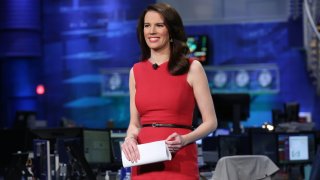
Kelly Evans: Boom! Yields drop below 4%
We just talked about how bond yields have dropped sharply in recent weeks, and could even head back below 4% soon. Well, they went below 4% this morning.
And not for a great reason, either. New jobless claims jumped last week to almost 250,000, normally a sign of labor market deterioration. The 10-year Treasury yield sank to 4.01%, and then pierced below 4% for the first time since February after the unimpressive U.S. manufacturing reports. See, the Fed should have cut rates yesterday! came the immediate chorus.
But I'm still in the Stephen Stanley (of Santander Bank) camp, that this is exactly what happened last summer with jobless claims, and I don't want to fall for the headfake again. And in fact, claims have jumped the past couple weeks due to Michigan auto plant closures, and Texas effects of Hurricane Beryl. "If we are still running in the 240s (or higher) by late August, then I will revisit my view," Stanley wrote this morning.
Remember, we want yields to go sub-4% for good reasons, like disappearing inflation, not bad reasons, like a faltering economy. Tomorrow, we get the key monthly jobs report. If Stanley is right, and the unemployment rate declines because labor market gauges like job openings are still stronger than they were pre-pandemic, that would be a fantastic sign.
Get top local stories in Connecticut delivered to you every morning. Sign up for NBC Connecticut's News Headlines newsletter.
But if the unemployment rate keeps rising, the recession calls will grow louder. Yes, you can somewhat plausibly argue that the rate is up because we haven't absorbed the surge of immigrants into the job market yet. But if unemployment keeps rising and leading measures like jobless claims keep getting worse, it's an ominous development.
Are there any other glimmers of positivity? Yes. Credit markets remain incredibly strong. Like, record-breaking, historically strong. That means companies can easily raise debt to finance investment (or buybacks). It also tells us that investors aren't too jittery about a looming recession triggering a wave of defaults.
"July shattered the record for corporate bond flows," wrote strategist Brian Reynolds this morning. The amount of new bonds that investors bought was 25% higher than in any previous July, he noted. And we learned this week that Ares, an investment fund, raised a whopping $34 billion for its private-credit fund, which is almost double the previous record for the size of such a fund that was set just back in May.
Money Report
"Taken together, the above developments support our theme of a more durable and more intense credit-led bull market," Reynolds said, albeit with "some downdrafts over time due to the lack of enthusiasm of equity investors."
Now, just imagine if Jim Paulsen is right, and the Fed keeping rates where they are--at nearly 5.5%--is itself a key reason why bond yields have stayed high even while inflation moderated. "It would not be shocking if the 10-year bond yield fell closer to 3% once the Fed finally cuts," he argued today, saying that it would remove the "artificial barrier" of high overnight borrowing rates.
In fact, he says, based on a mix of economically sensitive commodity prices, the 10-year yield could plausibly be closer to 1%. If that sounds crazy, read again about the deflationary problems in China. Paulsen says he wouldn't be surprised to see yields below 3% in the coming year. That of course would be an incredibly bullish development--and may help explain today's high stock prices--if the U.S. expansion can keep ambling along.
See you at 1 p.m...
Kelly
Click HERE to sign up for this newsletter in one easy step.
To hear this as a podcast, subscribe to "The Exchange" and pick "From the desk of..."






